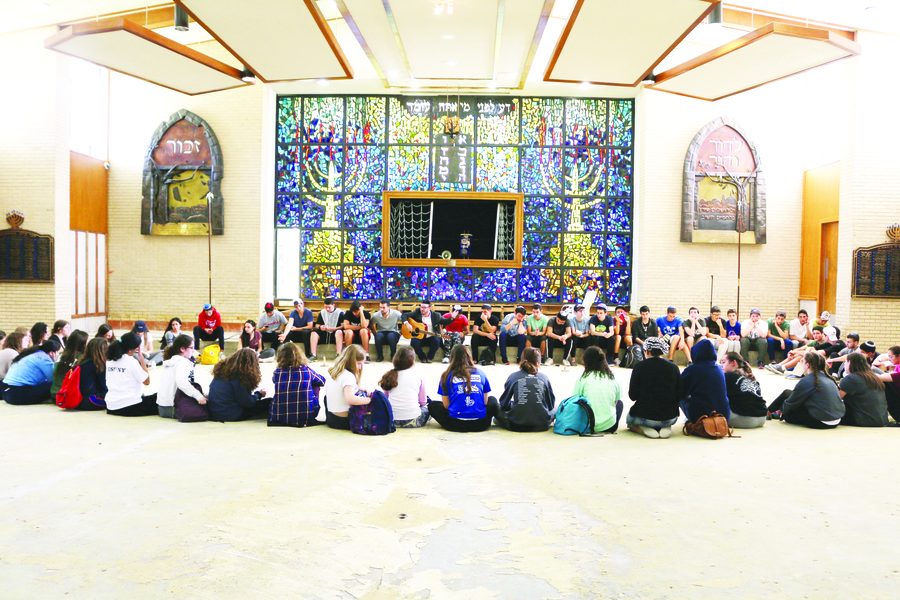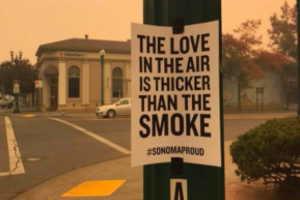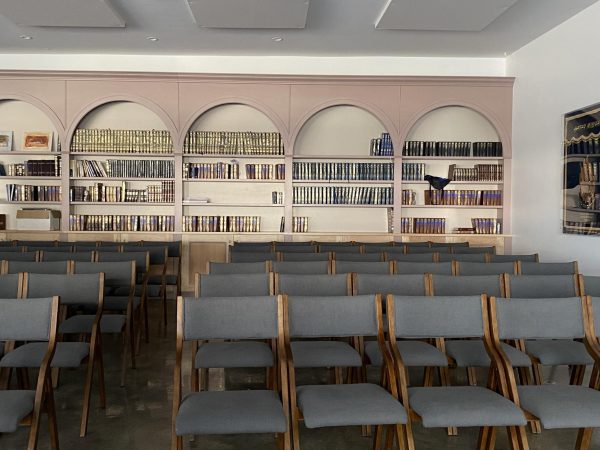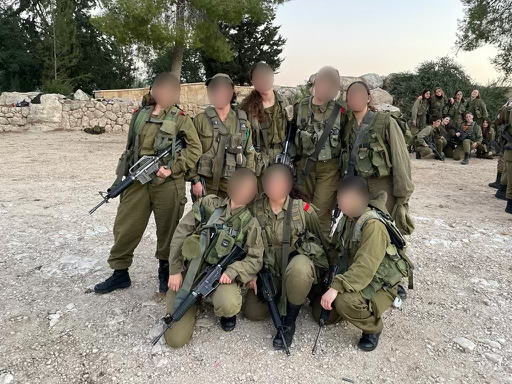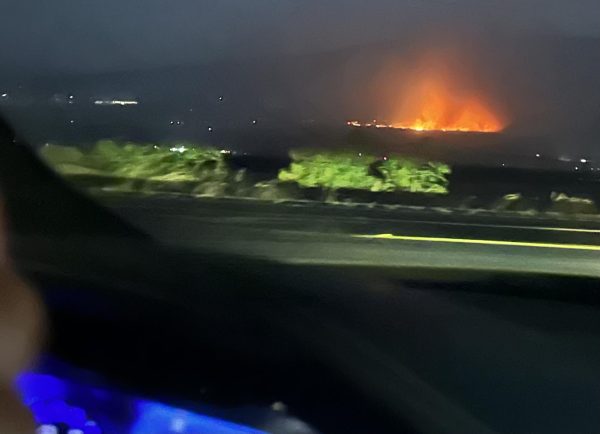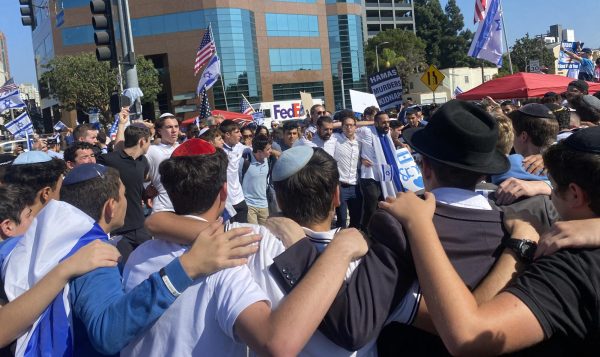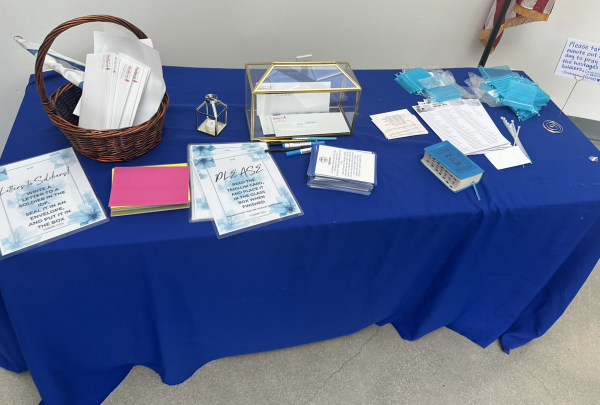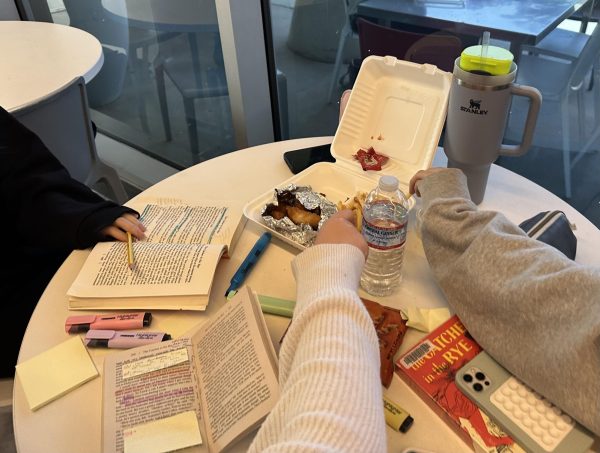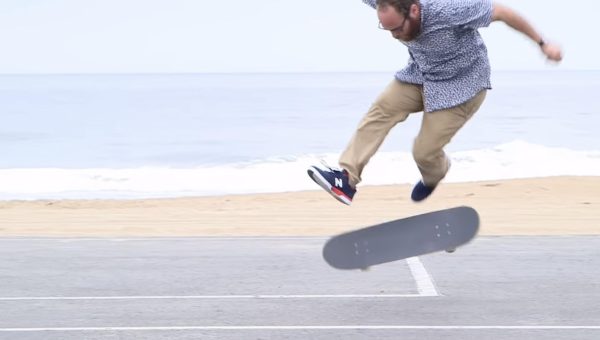With hammers and heart, juniors help rebuild Houston on chesed trip
At midnight Aug. 26, Maya Wadler was the only member of her family awake as rains pounded the streets and water seeped through the floorboards of her Houston home.
At 2:30 a.m., her house was two feet deep in water, and the fire department had arrived for a “mandatory evacuation.”
“We ran out of the house without clothes or shoes, we just had what was on us,” Maya said. “We went in a boat to the highway, where they put us in a dump truck to drive to a shelter. Obviously I was crying and really scared.”
Maya, a senior at Robert M. Beren Academy, is one of 42,000 Houstonians whose homes were damaged due to record flooding in category 4 Hurricane Harvey, according to the Federal Emergency Management’s website. Houston got the largest amount of rainfall ever recorded in the United States from a storm, with 51.88 inches of rain. Lasting from Aug. 23 to September 3, the hurricane killed 82, according to widespread media reports The Washington Post.
On their chesed trip to Houston — rescheduled from November to October to respond to the record-setting storm — the juniors visited Beren Academy, Rabbi Segal’s former school, where Maya said 70 out of 350 students’ homes were flooded.
From Oct. 15 through 19, Shalhevet’s juniors hammered away drywall, pulled nails from walls, and removed doors from hinges to break down several houses that had been flooded so they could be rebuilt.
The 62-person class also volunteered at the Houston Food Bank, played basketball and volleyball against Beren Academy’s teams, and visited the Orthodox Union Synagogue (OUS) which had been flooded and gutted, stripped of its carpeted floors. Many of its doors were removed, and just before the storm its Torahs had been taken out and preserved.
During one of their two seven-hour construction days, the group worked on a house belonging to Mr. Ronald Parker, 65. With Jewish disaster relief organization Nechama, students learned how to complete each construction task as they approached it — with two Nechama supervisors appointed to each of the five groups at various houses, as these projects were most of their first experiences working with tools.
Mr. Parker was born on the couch in this house, was raised in it, and lived there with his mother and two brothers until Harvey. The four of them had been residing in a motel for 51 days due to flooding.
“A regular, plain, vanilla motel — it’s boring,” Mr. Parker said. “I want my satellite, I want all my computers back up. I want to play with all my computers like I was before the flood.”
This was the third major flood his house had endured, the first two being Tropical Storms Dean in 1995 and Allison in 2001. But the most recent one came as a surprise to him and his family.
“I knew about Harvey, but I didn’t think it was going to strike Houston,” he said. “We looked out of the window on the night it was coming up, and we had virtually no water.”
But within an hour the water had progressed to six inches, and it rose rapidly.
“The next time we looked out, about an hour-and-a-half later, the water was all up to the driveway and the gates,” Mr. Parker said. “One more hour and water was bubbling up under the seals of the perimeter of the house. So we had this awful smelling water, and it looked like water from the toilet coming into the house. It was over 24 inches.”
The water levels exceeded expectations, and many in Houston were left scrambling for shelter as the storm continued to rage. Maya said that while she and her father stayed home, her mother and sister had gone to a neighbor’s house that was on higher ground for protection.
But this only helped temporarily.
“The neighbor’s house had begun to take on water, so they had been rescued separately by the police department,” Maya said. “We weren’t expecting that. They’re two feet above us, so it’s kind of crazy that they also got water.”
After seeing the damage that Hurricane Harvey had done further south in Rockport, Tex., in the storm’s first days, Simon Gerst — a junior at the pluralistic Emery Weiner High School — and his brother took precautionary measures.
“Not much is still there today, and we all saw what Harvey was about to unleash on Houston,” said Simon. “Me and my brother ran to a local sporting goods store and bought a huge cooler to keep perishable foods in, and we arrived only to find about five coolers left. My parents bought 36 60-pound sandbags and covered up the house from the outside.”
Simon was watching the McGregor vs. Mayweather boxing match at a friend’s house in the Jewish neighborhood of Bellaire, Tex., when the hurricane hit. Although neither his or his friend’s houses suffered any damage, he and 10 others were stuck inside the friend’s house for three days due to water levels outside.
“We were quickly trapped inside the house, and found ourselves surrounded by four feet of water the next morning,” Simon said. “My car was submerged, and because there was so much water, my dad couldn’t come get me until the water receded enough that the streets were safely driveable.”
Rabbi Barry Gelman of United Orthodox Synagogue showed the juniors around his home, which had been damaged by its second flood, and the flooded shul as well.
He described how the synagogue’s dining hall had doubled as a makeshift sanctuary during high holiday services, as it was the room that sustained the least amount of damage, and took students on a tour of the building before before sharing a take-out Chinese dinner. On their last morning on the way to the airport, the juniors and faculty chaperones sat in a circle in the main sanctuary and sang zmirot, Jewish songs, that echoed through the cavernous, empty room.
Rabbi Gelman described the complicated reality of moving forward after a hurricane.
“After the emergency is over and people have dried out their homes and taken out their ruined belongings, there are a lot of needs that need to be met in terms of expenses that were not anticipated before the flood,” Rabbi Gelman said.
“We’ve been very fortunate that there’s been an outpouring of support from all over the country.”
The juniors’ trip to Houston came from a relatively last-minute change of plans in location and dates. In an email from Principal Dr. Noam Weissman to the junior families Sept. 14, he explained the reasoning for the switch from previous plans, which would have taken the class on a shorter chesed trip to Las Vegas in November.
“Initially, our plan was to have this chesed trip in late November to a different community closer to L.A., but then Houston was devastated by this hurricane,” Dr. Noam Weissman wrote. “From reports we’ve heard, there is endless amount of work to be done and we are proud to go there to help, and do whatever we can.”
Chesed coordinator Mrs. Sarah Leah Gormin said the Houston community reached out to her and to head of school Rabbi Segal for help.
“We saw a great need, and we had to act soon,” Mrs. Gormin said. “While we are not immediate responders, the students became lifelines for many lives in Houston.”
The juniors said their trip to Houston was humbling, and made them more appreciative of they what they had.
“It made me really appreciative of what I have at home and how thankful I am for my friends,” said Kira Faerstain. “The man of the house I was cleaning lost everything and was completely alone, and it made me realize how grateful I am.”
Natanel Sadeghi said that seeing the destruction in person could not be compared to reading about it or seeing pictures.
“The Houston trip was very meaningful and eye opening to me,” Natanel said. “I stay updated with all the current events that happen and they all have photos and videos. But to go and see all of it first hand and hear the stories of the people who live there was such a different experience.”
Simon Gerst of Emery Weiner School said his city had come together in the disaster.
“Houston is an amazing and resilient city, and the response to the aftermath of Harvey is truly indicative of that,” said Simon. “I was out of school for a week, and when we got back, the entire school community volunteered to help families in the Emery community and the Jewish community.
“It was incredible to see the communal love, and it truly exemplifies the culture of the Jewish community and Houston as a whole.”
While her house is being redone, Maya and her family have temporarily moved into a condo near the Best Western Hotel where the juniors stayed, six miles away from the shul that her family normally walks to. She said the situation makes being religiously observant more complicated, and that her family has to find places to stay for holidays and Shabbat.
“It’s a really good location,” she said of the Best Western, “but not good for Jews. We come in every Shabbos and also for the chagim. We’re going to be doing that for the next eight months, apparently, because my house isn’t going to be ready for eight months.”
Rabbi Gelman, who has four children himself, now faces the challenge of leading a community in moving forward.
“The mantra that we’ve been using is putting one foot in front of the other, and not getting paralyzed,” Rabbi Gelman said. “We’ve tried to help people realize that this is a terrible situation and we don’t want to sugarcoat that, but at the same time, to give people the sense of confidence that with community support, ultimately they’ll be able to come out on the other side okay.”
This story won Second Place, Award for Excellence in a Multi-Media Story in the Simon Rockower Awards of the American Jewish Press Association; Honorable Mention in the Multimedia Storytelling category of the 2018 Quill & Scroll International Writing, Photo and Multimedia Contest; Certificate of Merit for Video News Package in the 2019 CSPA Digital Gold Circle Awards; and first prize for multimedia reporting in the 2018 Jewish Scholastic Journalism Awards of the Jewish Scholastic Press Association.
The Rockower judges said: The combination of writing and video made this a strong entry. The video illustrates the damage from Hurricane Harvey in a way that the words cannot. The handheld camera style conveys authenticity, and the multiple voices demonstrate a depth of reporting and editing. Jewish themes are replete in the story itself: repairing the world, kindness to the stranger, and so on.
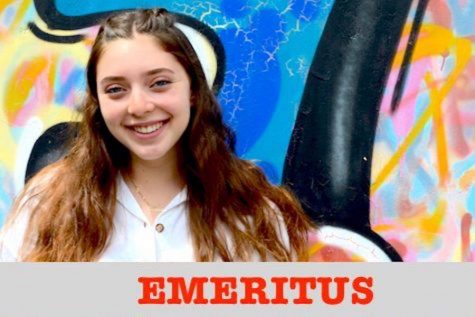
Lucy Fried was co-editor-in-chief during the 2018-19 school year and went on to study at the Hartman Institute in Jerusalem. She is now a junior at UC Berkeley.

